Myanmar cuisine is established around rice or noodles, usually served with a variety of curries between meat and fish, along with a dish of vegetables, salads, soup, and condiments. Myanmar curries tend to be less spicy than those served in Thailand. Meals & drinks at International Hotels are considerably expensive. There are many good local restaurants with almost the same quality of food and hygiene as hotels but at reasonable prices. They serve various dishes of Myanmar, Chinese, European (French and Italian), Thai and Indian cuisine. But roadside small restaurants are not recommended, as it can be risky for health.
There are also a wide variety of local snacks and delicacies. Mouk-hin-kha (thin rice noodles served with fish gravy and onion soup) and Ohn-noh-khauk-swe (noodles served with chicken and coconut gravy) are the most popular in Myanmar. Shan food is another delicacy. Shan style of cooking neither belongs to Myanmar nor Chinese nor Thai cuisine but they taste really good in their own way.
Restaurants and food served towards the travelers are carefully selected for hygiene as well as gastronomic considerations.
Breakfast – snack in the street: 1 to 5 USD per pax.
Myanmar lunch: 8 to 10 USD per pax.
Chinese – Asiatic meal: 10 to 15 USD per pax.
Tourist restaurant: 15 to 18 USD per pax.
Hotel: 20 to 30 USD per pax.
4**** : 30 to 50 USD per pax.


